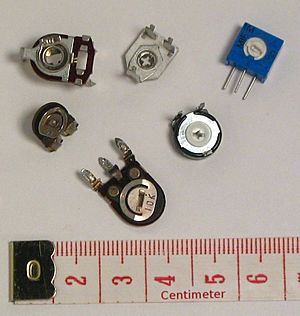Trimmer potentiometer facts for kids
A trimmer potentiometer is a special type of potentiometer that is very small. Think of it like a tiny, hidden volume knob for electronic circuits! You usually need a screwdriver to adjust it, and it's not meant to be changed often.
Contents
What is a Trimmer Potentiometer?
A trimmer potentiometer, often called a "trimpot," is a tiny electronic part. It helps engineers fine-tune how an electronic circuit works. Unlike the volume knob on your radio, trimpots are set once during manufacturing or repair. They are then left alone.
How Do Trimmers Work?
Just like a regular potentiometer, a trimmer has three connection points. Inside, there's a resistive track and a moving part called a "wiper." When you turn the screw, the wiper moves along the track. This changes the electrical resistance. By changing the resistance, you can control things like:
- The brightness of a light
- The speed of a motor
- The exact voltage in a circuit
Why Are They Called "Trimmers"?
They get their name because they are used to "trim" or make small, precise adjustments. Imagine you're trying to get a circuit to work perfectly. A trimpot lets you fine-tune it until it's just right. It's like making a small, final adjustment to something to get it exactly where you want it.
Where Can You Find Trimmer Potentiometers?
Trimmer potentiometers are found inside many electronic devices. You might not see them easily because they are often hidden away on circuit boards. They are common in:
- Radios and audio equipment (for setting specific sound levels)
- Computers and other digital devices
- Industrial control systems
- Medical equipment
- Anywhere a circuit needs a precise, one-time adjustment
Trimmers vs. Regular Potentiometers
The main difference between a trimmer and a regular potentiometer is how they are used.
- Regular potentiometers (like a volume knob) are designed for users to adjust often. They are usually bigger and have a knob you can turn with your fingers.
- Trimmer potentiometers are much smaller. They are made for engineers or technicians to adjust only a few times. They need a tool, like a screwdriver, to turn them. This prevents accidental changes.
Images for kids
 | Victor J. Glover |
 | Yvonne Cagle |
 | Jeanette Epps |
 | Bernard A. Harris Jr. |



